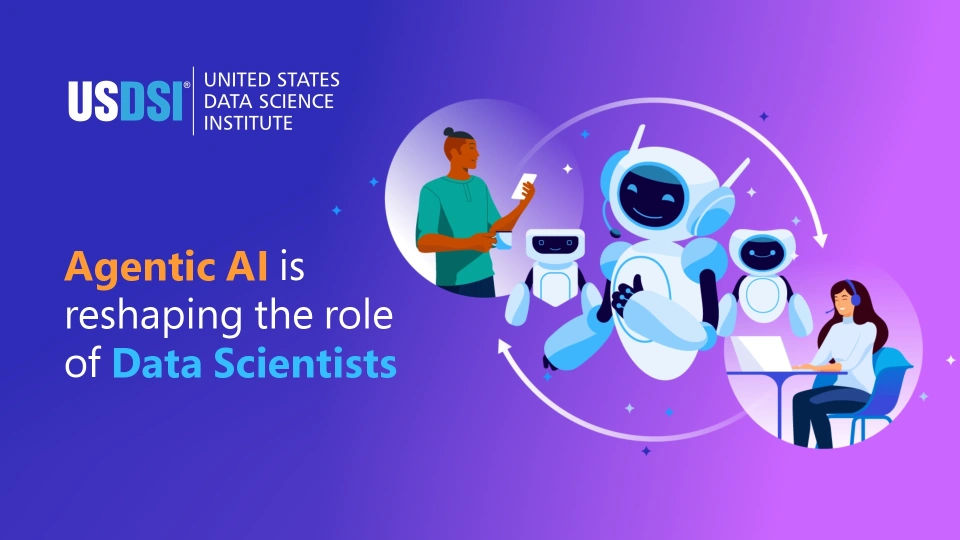
The advent of Agentic AI – autonomous, adaptable, multi-step problem-solving systems that are capable of initiating actions with minimal human intervention- has led the evolution of artificial intelligence to enter the transformative era.
Unlike the traditional predictive or generative AI tools, these agentic AI systems can proactively execute tasks, plan iteratively, and learn continuously.
Based on a Gartner, Inc. report, by 2029, agentic AI will handle 80% of routine customer service issues independently. This will lead to a 30% drop in operational costs by reducing the need for human intervention.
This integration of Agentic AI in data science is leading a fundamental shift in the data science landscape; however, it is not making data scientists obsolete. Instead, it is enhancing their roles from manual data processors to model builders to strategic orchestrators and architects of AI systems.
The Shift from Execution to Orchestration
Traditionally, the work of data science involved a cyclical process of data collection, cleaning, feature engineering, model training, and model deployment. These are often manual tasks that consume a lot of time as well as require a high degree of technical expertise in coding and statistical analysis. But with the introduction of agentic AI, several tasks can be automated, including
AI agents can help data scientists, autonomously, manage Extract, Transform, and Load (ETL) processes. These AI agents scan detect schema changes, identify bottlenecks, and dynamically optimize data flows in real time. This will help free up data science professionals' time from the operational burden of debugging pipelines and allow them to focus on high-level architecture and a data quality framework.
The advanced agent systems can now automatically select, build, deploy, and monitor machine learning models on their own. When a model's performance deteriorates, the AI agent can autonomously retrain it on new data and reapply the updated version all by itself.
This means that data scientists are now shifting their focus from the technical intricacies of model building to setting the guardrails, compliance checks, and key performance indicators that can guide these autonomous systems.
Instead of simply generating static dashboards, agentic AI can continuously monitor the data streams, detect anomalies, and send insights to relevant stakeholders proactively.
This means the role of data analyst is transforming from a mere reactive dashboard creator to a proactive strategist who interprets complex insights from the outputs of autonomous systems.
Redefined Roles and Their Essential Skill Set
The combination of data science and artificial intelligence and the rise of agent AI has created several new opportunities and requires professionals to acquire a new set of skill set to thrive in this evolving job market. The data science roles are becoming more strategic, interdisciplinary, and human-centric.
The data science industry has evolved rapidly, and so has the role of a data scientist. In the future, they will be a master coordinator who will balance the technical framework, business, goals, and ethical considerations.
Because of the AI revolution, their primary responsibility will transform to designing, deploying, and monitoring the agentic systems that will be handling regular data science workflows. Therefore, they will need a solid understanding of business concepts to effectively frame complex problems for the AI to solve.
It is essential for data science professionals to upskill in areas like agentic AI frameworks, reinforcement learning, and multimodal AI to succeed in this new era. They should have a strong knowledge of broader ecosystems, including cloud, computing, API integrations, DevOps, etc.
Furthermore, they should also know how to ensure data transparency, compliance, and interpretability, especially in regulated industries like finance and healthcare.
In the future, as AI agents handle the technical execution, data science leaders need to focus on higher-level strategic activities. This will include designing business strategies aligned to AI, ensuring data governance, and addressing the ethical risks associated with autonomous decision-making. The explainability of machine learning models, i.e., the ability of these professionals to interpret and explain the behavior and decisions of these systems to human stakeholders, will also become very important.
What does the future look like?
Agentic AI is indeed a promising technology and can offer significant advantages like better efficiency, scalability, and predictive agility; however, its adoption is not without challenges. One major hurdle is system interoperability.
Agentic AI thrives on seamless access to diverse data streams and systems, but many enterprises are still limited by fragmented, legacy infrastructure. Also, the ethical implications of autonomous systems taking direct operational actions require attention to transparency, auditability, and clear decision-making logic.
Despite the challenges, we must also acknowledge the opportunities for both the data science industry and data science careers. Agentic AI is a transformative technology changing data science from static tools to autonomous systems.
This means, data science professionals can now move away from repetitive manual tasks and focus on strategic, impactful, and collaborative relationships with AI.
It is time that data science professionals embraced AI.
By embracing this evolution, data scientists and analysts can leverage these powerful agents to drive faster insights, achieve greater scalability, and become indispensable orchestrators of AI-driven solutions.
This website uses cookies to enhance website functionalities and improve your online experience. By clicking Accept or continue browsing this website, you agree to our use of cookies as outlined in our privacy policy.